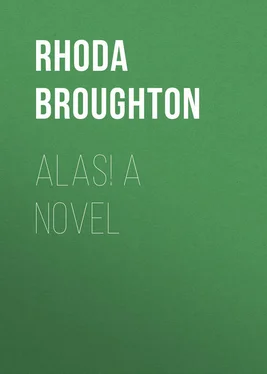Rhoda Broughton - Alas! A Novel
Здесь есть возможность читать онлайн «Rhoda Broughton - Alas! A Novel» — ознакомительный отрывок электронной книги совершенно бесплатно, а после прочтения отрывка купить полную версию. В некоторых случаях можно слушать аудио, скачать через торрент в формате fb2 и присутствует краткое содержание. ISBN: , Жанр: foreign_antique, foreign_prose, на английском языке. Описание произведения, (предисловие) а так же отзывы посетителей доступны на портале библиотеки ЛибКат.
- Название:Alas! A Novel
- Автор:
- Жанр:
- Год:неизвестен
- ISBN:http://www.gutenberg.org/ebooks/34428
- Рейтинг книги:4 / 5. Голосов: 1
-
Избранное:Добавить в избранное
- Отзывы:
-
Ваша оценка:
- 80
- 1
- 2
- 3
- 4
- 5
Alas! A Novel: краткое содержание, описание и аннотация
Предлагаем к чтению аннотацию, описание, краткое содержание или предисловие (зависит от того, что написал сам автор книги «Alas! A Novel»). Если вы не нашли необходимую информацию о книге — напишите в комментариях, мы постараемся отыскать её.
Alas! A Novel — читать онлайн ознакомительный отрывок
Ниже представлен текст книги, разбитый по страницам. Система сохранения места последней прочитанной страницы, позволяет с удобством читать онлайн бесплатно книгу «Alas! A Novel», без необходимости каждый раз заново искать на чём Вы остановились. Поставьте закладку, и сможете в любой момент перейти на страницу, на которой закончили чтение.
Интервал:
Закладка:
"Oh, do go on!" cries the child shrilly. "Oh, do make him do it again! Oh, why do you stop?"
And indeed through the whole of the ensuing conversation this cry recurs at short intervals with the iteration of a guinea-hen. But none of the three performers seems disposed to comply with this request. Two of them sit down decorously on chairs, and the third throws himself upon the floor panting, showing a fine red tongue, and dragging himself luxuriously along on his stomach to show his relief at his corvée being ended. The child has followed Elizabeth, and now stands beside her, tiresomely pulling at her white hands.
"Bertie has come to spend the day with us," she says, looking explanatorily up at Jim, but speaking with a formality very different, as he feels, from the exuberant ease and mirth that had marked her intercourse with Byng.
Jim had already had a flash of speculation about the child, as to whether he might be a late-come little brother, arrived on the scene at a period subsequent to his own connection with the family; since plainly the span of his small life did not stretch to a decade.
"Bertie is a new friend," he says kindly. "I do not know Bertie."
"His mother, Mrs. Roche, is a cousin of ours; she has a villa on Bellosguardo. Perhaps you know her?"
"I am going to a party at her house on Wednesday," cries Jim, in a tone of eager pleasure at the discovery of this fresh link, and of the vista of probable meetings which it opens up. "I shall meet you there?"
Elizabeth turns her head slightly aside and shakes it as slightly.
"No?"
"We are not going out."
The formula implies mourning, and yet the clothes both of Elizabeth and her mother are unmistakably coloured ones, and give no indication of an even moderately recent loss. But it is so clear that Miss Le Marchant means to add no explanation that he has to change the subject.
"Though Bertie is not an old friend," he says, smiling, "yet I have come across one here to-day – she opened the door to me; I should have liked to shake hands with her, only she looked so haughty – she never used to look haughty at the Moat."
"Do you mean nurse?" she asks.
"Yes, I knew her in an instant; she is not in the least changed, less even" – hesitating a little, as if doubtful whether the stiffness of their new relations warranted a personality – "less even than you."
She snatches a hasty look at him, a look upon which he sees, to his surprise, imprinted a character of almost fear.
"You must be laughing at me," she says, in a voice in which he detects an undoubted tremor; "I am very much changed."
There is such obvious apprehension in her whole manner, that his one thought – after a first flash of astonishment – is to reassure her.
"Of course I was only speaking of externals," he says quickly; "ten years could hardly be expected to leave any of us quite where we were as to our inner selves;" then, seeing her still look flurried, and becoming himself nervous, he adds, rather stupidly, the hackneyed Swinburnian couplet —
"'Time turns the old days to derision,
Our loves into corpses or wives!'
though I never could see that that was quite a necessary alternative!"
Ere the words are out of his mouth she has risen with precipitation, and begun hurriedly to re-arrange the branches of lilac in a scaldino on the table near her. She is apparently so awkward about it that one odorous white bough falls out on the floor. Before Jim can stoop to pick it up, Byng has rushed to the rescue. In eagerly thanking him, in receiving it back from him, and accepting his services in replacing it among its perfumed brothers, the girl, perhaps involuntarily, turns her back upon her former interlocutor, who sits for a moment staring rather blankly at her, and wondering what sting there could have lurked in his apparently harmless words to drive her away so abruptly. Whatever may have driven her away, there is certainly no doubt as to her being gone. Nor as Jim sees her moving about the room, followed by Byng, and showing him her treasures – the little wild red and yellow tulips she plucked in the field this morning; the chicken-skin box she bought at Ciampolini's yesterday, and mixing all that she shows with her delicate light laughter – can he buoy himself up with any reasonable hope of her ever, with her own good will, returning. He must be looking more blank than he is conscious of, for Mrs. Le Marchant's voice sounds quite apologetic in his ears, when, having been, like himself, deserted by her companion, she takes a seat near him.
"Elizabeth is so proud of her bargains," she says, glancing with a lenient smile towards her daughter; "she must show them to everybody."
"She never offered to show them to me," replies Jim, rather morosely; then, becoming aware of the almost puerile jealousy evidenced by his last remark, he adds:
"I am afraid I said something that annoyed Miss Le Marchant; I cannot think what it could have been. I told her how wonderfully little changed I thought her in the last ten years; but it could not have been that, could it?"
The mother's eye is still following her child, and, if it were not an absurd assumption, Burgoyne could have fancied that there was a sudden moisture in it.
"She is very sensitive," Mrs. Le Marchant answers slowly; "perhaps it would be safer not to say anything about herself to her."
"Perhaps it would be safer," rejoins Jim, with some ill-humour, "if you were to draw up a list of subjects for me to avoid; I have no wish to play the part of bull in a china shop; and yet I seem to be always doing it; imprimis" (striking the forefinger of his left hand with the right), "imprimis the Moat."
He pauses, as if expecting a disclaimer, but none such comes – "The past generally" (moving on to the second finger and again halting; but with no more result than before). "Yourselves" (reaching the third finger). Still that silence, which, if it mean anything, must mean assent. He looks impatiently in her face, to seek the response which her lips refuse him.
"On your own showing," she says gently, though in a rather troubled voice, "you have the whole field of the present and the future left you; are not they wide enough for you?"
His brows draw together into a painful frown.
"Perhaps I have as little cause to be fond of them as you have of the past."
It is a random shot, a bow drawn at a venture; but it could not have hit more true apparently had it been levelled with the nicest aim.
As her daughter had done before her, Mrs. Le Marchant rises hastily, and leaves him – leaves him to reflect ironically upon how wisely Amelia had acted in insisting upon his visiting these "dear old friends," upon whom the effect of his conversation is so obviously exhilarating.
"I wish I had not come; I wish it was time to go home!"
The small fractious voice that wails the two preceding sentences seems to be Jim's own mouthpiece. It is, in point of fact, the voice of Bertie, who, tired of uttering his unregarded request for the repetition of the concert which had filled him with such delight, has of late been trying the effect of his unassisted powers to bring about the desired consummation, by putting his arms as far as he can round the dog's body, and endeavouring to lug him towards the music-stool. The collie has been enduring this treatment for five minutes – enduring it with an expression of magnanimous patience, which seems to say, that, though it is undoubtedly an unpleasant experience, yet, as it is inflicted upon him by one of his own family, he must of course put up with it, when Elizabeth goes to the rescue. Elizabeth goes alone, since Byng is held in converse by her mother at the other side of the room. Verbal persuasions having entirely failed, she tries to loosen the child's arms; but his grasp, though puny, is obstinate, and the only perceptible result of her endeavours is the utterance by her young friend of the two polite aspirations above recorded.
Читать дальшеИнтервал:
Закладка:
Похожие книги на «Alas! A Novel»
Представляем Вашему вниманию похожие книги на «Alas! A Novel» списком для выбора. Мы отобрали схожую по названию и смыслу литературу в надежде предоставить читателям больше вариантов отыскать новые, интересные, ещё непрочитанные произведения.
Обсуждение, отзывы о книге «Alas! A Novel» и просто собственные мнения читателей. Оставьте ваши комментарии, напишите, что Вы думаете о произведении, его смысле или главных героях. Укажите что конкретно понравилось, а что нет, и почему Вы так считаете.












